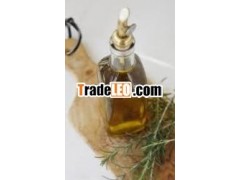Description:
We are leading manufactures, exporters & suppliers of PureRosemary Oil : -1. High Quality
2. Reasonable Price
3. No MOQ.
FRESH ROSEMARY OIL
Overview:
Rosemary (Rosmarinus officinalis) is widely used as a spice whencooking, especially in Mediterranean dishes. It is also used forits fragrance in soaps and other cosmetics. Traditionally, rosemaryhas been used medicinally to improve memory, relieve muscle painand spasm, stimulate hair growth, and support the circulatory andnervous systems. It is also believed to increase menstrual flow,act as an abortifacient (causing miscarriage), increase urine flow,and treat indigestion. Almost none of these uses have been studiedscientifically in humans. However, one study in humans found thatlong term daily intake of rosemary prevents thrombosis.
In the lab, rosemary has been shown to have antioxidant properties.Antioxidants can neutralize harmful particles in the body known asfree radicals, which damage cell membranes, tamper with DNA, andeven cause cell death. Also in the lab, rosemary oil appears tohave antimicrobial properties (killing some bacteria and fungi intest tubes). It isn''t known whether rosemary would have the sameeffect in humans.
Indigestion
Rosemary leaf is used in Europe for indigestion (dyspepsia) and isapproved by the German Commission E, which examines the safety andefficacy of herbs.
Muscle and Joint Pain
Applied topically (to the skin), rosemary oil is sometimes used totreat muscle pain and arthritis and to improve circulation. It isapproved by the German Commission E for this purpose. However,there is no scientific evidence that it works.
Alopecia
Historically, rosemary has been used to stimulate hair growth.Rosemary was used in one study of 84 people with alopecia areata (adisease in which hair falls out, generally in patches). Those whomassaged their scalps with rosemary and other essential oils(including lavender, thyme, and cedarwood) every day for 7 monthsexperienced significant hair regrowth compared to those whomassaged their scalps without the essential oils. But the study wasnot well designed, and it is impossible to say whether rosemarycaused the hair growth.
Neutralize Foodborne Pathogens
Several studies show that rosemary inhibits foodborne pathogenslike Listeria monocytogenes, B. cereus, and S. aureus.
Improve Memory or Concentration
Rosemary is often used in aromatherapy to increase concentrationand memory, and to relieve stress. One study suggests thatrosemary, combined with other pleasant smelling oils, may lowercortisol levels and help reduce anxiety. Another study found thatthe use of lavender and rosemary essential oil sachets reduced testtaking stress in graduate nursing students.
Plant Description:
Native to the Mediterranean area, rosemary now grows widely inother parts of the world. It thrives in a warm and sunny climate.The plant takes its name from rosmarinus, a Latin term meaning"sea dew." It is an upright evergreen shrub that can grow to aheight of 6 and a half feet. The woody rootstock bears rigidbranches with fissured bark. The long, needle-like leaves are darkgreen on top and pale beneath. Both the fresh and dried leaves arearomatic. The small flowers are pale blue. The leaves and parts ofthe flowers contain volatile oil.
Available Forms:
Dried whole herb
Dried, powdered extract (in capsules)
Preparations made from fresh or dried leaves, such as alcoholtinctures, teas, and liquid extract
Volatile oil (to be used externally, not orally)
How to Take It:
Pediatric
Because rosemary has not been studied in children, it is notrecommended for medicinal use in those under age 18. It is safe toeat as a spice in food, however.
Adult
Rosemary can be used as a tea made from the dry herb, a tincture,fluid extract, decoction for a bath, or as an essential oil mixedwith other oils for topical use. Speak to your health care providerto find the right dose for your condition. Total daily intakeshould not exceed 4 - 6 grams of the dried herb. Do not takerosemary oil orally.
Precautions:
The use of herbs is a time honored approach to strengthening thebody and treating disease. Herbs, however, can trigger side effectsand interact with other herbs, supplements, or medications. Forthese reasons, you should take herbs with care, under thesupervision of a health care provider.
Rosemary is generally considered safe when taken in recommendeddoses. However, there have been occasional reports of allergicreactions. Large quantities of rosemary leaves, because of theirvolatile oil content, can cause serious side effects, includingvomiting, spasms, coma and, in some cases, pulmonary edema (fluidin the lungs).
Because higher doses of rosemary may cause miscarriage, pregnantand nursing women should not take rosemary as a supplement. It issafe to eat as a spice in food, however.
People with high blood pressure, ulcers, Crohn''s disease, orulcerative colitis should not take rosemary.
Rosemary oil can be toxic if ingested and should never be takenorally.
Possible Interactions:
Antiplatelet and anticoagulant drugs (bloodthinners)
Rosemary may affect the blood''s ability to clot. It couldinterfere with any blood thinning drugs you are taking,including:
Warfarin (Coumadin)
Clopidogrel (Plavix)
Aspirin
ACE inhibitors
Rosemary may interfere with the action of ACE inhibitors taken forhigh blood pressure.
Captpril (Capoten)
Elaropril (Vasotec)
Lisinopril (Zestril)
Fosinopril (Monopril)
Diuretics (water pills)
Because rosemary can act as a diuretic, it can increase the effectsof these drugs. That can raise your risk of dehydration.
Furosemide (Lasix)
Hydrocholorothiazide
Lithium
Because of its diuretic effects, rosemary might cause the body tolose too much water and the amount of lithium in the body to buildup to toxic levels.
Diabetes
Rosemary may alter blood sugar levels and could interfere with anydrugs taken to control diabetes.
Pure Rosemary Oil Rosmarinus Officinalis








